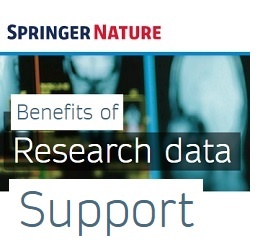Make FAIR your Datasets using Springer Nature RESEARCH DATA SUPPORT
25/01/2018


RESEACRH DATA SUPPORT is an optional Springer Nature service available (starting 23 January, 2018) to researchers who have datasets they want to share, and make citable and findable. The final goal is to help researchers, institutions and funders make progress towards Findable, Accessible, Interoperable and Reusable (FAIR) data.
|
"Extending Research Data Support to the whole community" : |
Who can use Research Data Support ?
If you are an author in the process of submitting a manuscript to participating Springer Nature journals, you will be able to access Research Data Support through the manuscript submission system. A list of the journals which make the service available to authors is available here.
If you have an article in process at a Springer Nature journal that does not currently offer this service find out if we can accept your data by completing this form and uploading your data.
If you want to share data associated with an article you’ve already published with Springer Nature, please access the service here.
If you have data supporting previous publications that were not published by Springer Nature you are still able to able to utilise Research Data Support. To access the service, please complete this form and upload your data.
Benefits of Research Data Support
SPRINGER NATURE provides a secure portal for data upload, and data and metadata are curated and improved by professional Research Data Editors. In particular, to make this happen, a team of Research Data Editors (in consultation with the researcher) will:
- Enhance metadata of datasets to improve their discoverability and encourage reuse
- Assign DOIs to datasets, making them easily identifiable and citeable
- Link data to their associated research, increasing visibility and potential for reuse
- Further increase visibility by creating data availability statements for use in research publications
- Provide a report detailing checks and improvements made to datasets
|
Did you know What is involved in archiving life science datasets? “Easier said than archived” ? Learn more from Life Science Database Archive (LSDB Archive) that collects and stores over 130 datasets (as national public goods) generated by life scientists... LSDB Archive makes it easier for researchers, companies and citizens to:
|
If you would like more information on the RESEARCH DATA SUPPORT services offered, please contact [email protected].
Related :
- FAIR Metrics : Framework to understand how increasing the FAIRness is ...
- FAIR principles and metrics for evaluation (SlideShare, 2017)
- Practical challenges for researchers in data sharing (Springer Nature Survey, 2018)
- Research Data Alliance (RDA) IGAD Pre-meeting (19-23 March 2018) focuses on the implementation of the FAIR principles
- FAIRsharing : Find, Register, Claim your Standard, Database, and Policy
- Enabling FAIR Data Project (COPDESS: Coalition on Publishing Data in the Earth and Space Sciences)
- Guidelines for Data Management Plan from SNSF : learning from each other
- Recorded Webinar on "Data-Driven Agriculture : an overview"
- License your Research Data with help of FACT SHEET on CREATIVE COMMONS & OPEN SCIENCE
- Data sharing: is it all about trust?
- Data Sharing : there is no One-Size Fits-All solution ...
- Recorded Webinar : "Love DATA MANAGEMENT" (CESSDA ERIC)
- Explanation of the FAIR Data principles by the Dutch Centre for Life Sciences
- FAIR Webinar series : #1 Findable #2 Accessible #3 Interoperable #4 Reusable (recorded ANDS webinars)
- Towards Digital Object Cloud (DOC) compliant with the FAIR principles
- Building a Culture of Data Citation ... with Persistent Identifiers
- Göttingen eResearch Alliance about eResearch related questions and Data Management issues
In 2017:
- Springer opened its entire list of journals to Research4Life: 992 additional journals from Springer are now available through AGORA !
- the preprint AgriXiv site was launched with support from Open Science Framework (OSF), as part of fulfilling its objective of development of community e-infrastructure, capacity building and framework for policies related to Open Access, Open Data and Open Education.
- the EarthArXiv was launched as the fifteenth community preprint service built on COS’s flagship platform, the OSF, which helps researchers design and manage their project workflow, data storage, DOIs, and collaboration. EarthArXiv provides free, open access, open source archives for the earth sciences.
| To keep up-to-date with AIMS news, please Become AIMS member (& sign up for AIMS newsletter) and follow @AIMS_Community on Twitter. |
